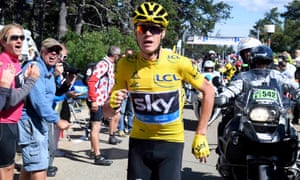On the verge of Tour victory … but will Chris Froome win British hearts? | Sport
As Chris Froome rides over the polished cobblestones of the Champs Élysées on Sunday afternoonlater today, the cyclist will surely enter the pantheon of British sporting greats.
After finishing the penultimate stage of the Tour de France 54 seconds ahead of his closest rival on Saturday, the 32-year-old is a certainty, barring accidents, to win the brutal race for a fourth time, something only four other men have ever done.
Froome’s domination of the event since his first victory in 2013 has been unrelenting. A series of crashes put him out of the 2014 Tour, but ever since he has crushed all opposition in his pursuit of the maillot jaune, the famous yellow jersey that signifies the overall race leader.
Yet for a British champion who has little left to prove in his chosen field, Froome is yet to be fully embraced by the British public. He is not praised for his achievements in the way that athletes such as Daley Thompson, Steve Redgrave or Paula Radcliffe have been, or sportsmen such as Ian Botham, Bobby Moore or Andy Murray.
“He’s now closing in on five-times Tour winner Eddy Merckx, who is popularly regarded as the greatest ever road racer,†Ellis Cashmore, professor of sociology at Aston University, Birmingham, and author of Sports Culture, said. “The problem for Froome is that cycling is a tainted sport. Lance Armstrong changed everything. It will be years before cycling purges itself of its close association with doping.â€
The shadow of performance-enhancing drugs has obscured every cycling achievement since Armstrong was exposed in 2012 and stripped of his seven titles. Froome’s success arrived a year later, under the regime of Team Sky and its general manager, Sir Dave Brailsford.
Every turn of Froome’s pedals and his every heartbeat are measured, scrutinised and debated by fans, pundits and other riders looking for any hint that he is not quite as good as he looks.
In 2013 he won the 15th stage of the Tour de France from Givors to Mont Ventoux, a particularly vicious climb that sometimes leaves competitors gasping into an oxygen mask. Froome’s victory provoked veiled allegations from some who could not understand how his heart rate had not leapt when he overtook his rivals in a fury of pedalling.
Froome later underwent a physiological examination that showed an extraordinary ability to generate power.
His rake-thin frame is undoubtedly an asset. Froome’s Tour race weight is a mere 67kg, stretched over 6ft 1in. He cycles hunched over his handlebars, elbows splayed, staring down rather than out at the backdrop of the Alps, the Pyrenees or the Massif Central during his odyssey around France.
Perhaps the other reason why Froome has not yet cemented a place in British hearts is his upbringing in Africa. Born in Nairobi to Jane and Clive Froome, the latter of which represented England’s under-19s at hockey, Froome lived in Kenya until he was 13, then went to secondary school in Bloemfontein in South Africa and afterwards the University of Johannesburg. He retains a South African tinge to his accent, like Kevin Pietersen, another unfeted British sportsman, and now lives in Monaco with his wife Michelle.

Yet his older brothers came to England for their schooling, and he has always maintained strong ties here. “He has held a British passport since birth, his grandparents are British, and he registered as a British national and started racing under a British licence in 2008,†Nigel Wynn, the former deputy editor of Cycling Weekly, wrote. “He identifies himself as British. Has post-Brexit Britain become so inward-looking that we discount Froome as British? It seems unlikely, and more importantly, unjustifiable under scrutiny.â€
When Froome failed to gain a nomination for the BBC’s Sports Personality of the Year award last year, after his third Tour de France win, the Olympic triathlete Jonny Brownlee spoke out against the decision. “People struggle to warm to Froome’s personality, but I really respect him,†Brownlee said. “He says: ‘I’ll just train really hard and do what I need to win’. He should have been nominated.â€
Although road cycling can seem arcane to the casual viewer, Froome’s tactics and courage have been hallmarks of his career. The 2015 race turned when Froome attacked Nairo Quintana on the mountain stage to La Pierre St Martin, landing a psychological blow. In 2016 Froome was forced to run uphill after a collision with a motorbike damaged his bike and he had to get a replacement from his team.
For this year’s Tour, Froome has dominated without winning a stage before the 22km time trial around Marseille. His riding has been less spectacular for fans, yet there have been moments of high drama: a 25-man pile up in Aachen involving Froome, a broken spoke beside the river Allier, and losing, then regaining, the yellow jersey from his rival Fabio Aru.
“The more time I’ve spent chasing the yellow jersey, the more I’ve come to appreciate the likes of Merckx, the guys who have won it five times, and just how hard that is,†Froome said. It has been, he said, his “toughest challenge yetâ€. Until next year.
Britain’s top postwar sports stars
â– Chris Hoy, cyclist: Six Olympic golds, and the most successful Olympic cyclist of all time
â– Steve Redgrave, rower: Won gold medals at five consecutive Olympic Games
â– Daley Thompson, decathlete: Olympic golds in 1980 and 1984. Broke the world record four times
â– Joe Calzaghe, boxer: Supermiddle-weight WBO world champion for 10 years
â– Paula Radcliffe, marathon runner: World record holder since 2002
â– Tony McCoy, jockey: Champion jockey 20 times in a row
â– Tanni Grey-Thompson, paralympian: Won 11 gold medals at Paralympics from 1992 to 2004

0 Response to "On the verge of Tour victory … but will Chris Froome win British hearts? | Sport"
Posting Komentar